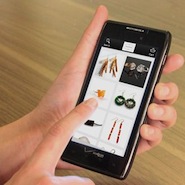 Mobile transactions continue to grow
Mobile transactions continue to grow
As mobile increasingly becomes an established channel for purchasing, retailers with strong smartphone shopping experiences are experiencing nearly double the growth rate in share of transactions, according to a new report released by Criteo.
Criteo’s State of Mobile Commerce Q4 report shows that the gap is growing between average retailers and those with strong mobile offerings. Compared with the fourth quarter of 2014, top retailers saw their share of mobile transactions grow 26 percent for a 44 percent share while, on average, the growth rate was 15 percent for a 30 percent share.
“During 2015, top retailers doubled down on mobile and widened the gap with the average when it comes to both the number and share of transactions that they’re experiencing,” said a Criteo spokesman. “Over the last year, the top quartile, as ranked by mobile’s share of ecommerce transactions, doubled the gap between the average, from 8 to 14 percentage points.
“Contrary to previous reports of tablets converting at higher rates, smartphones, which are much more plentiful, saw a growing share of total mobile transactions to 60 percent in Q4 2015, up 8 points over Q4 2014,” he said. “We believe that this trend will continue as retailers focus on mobile Web and apps that are tailored specifically for a smartphone experience.”
Nearing parity with desktop
For retailers with a strong mobile shopping experience, mobile transactions neared parity with desktop in the fourth quarter 2015, per the report.
By category, health and beauty saw the largest increase in mobile share at 38 percent, followed by home decor at 25 percent, mass merchants at 24 percent and fashion and luxury at 17 percent.
Smartphones’ share of mobile transactions increased 15 percent to account for 60 percent of all mobile transactions in the United States.
 Mobile also proved its strength on key shopping days, with mobile commerce share trending higher than average on Black Friday at 41 percent. There were 18 percent more mobile transactions on Black Friday than on Cyber Monday.
The report also found that cross-device purchasers are slightly more likely to use their mobile device to complete a transaction than the average.
Cross-device transactions
Mobile is playing an important role in browsing products on retailers’ sites prior to purchase, with nearly four-in-ten cross-device desktop purchases occurring after a shopper browsed a retailer’s site on at least one mobile device.
The report also found that half of cross-device mobile transactions are a result of mobile-only browsing.
Mobile also proved its strength on key shopping days, with mobile commerce share trending higher than average on Black Friday at 41 percent. There were 18 percent more mobile transactions on Black Friday than on Cyber Monday.
The report also found that cross-device purchasers are slightly more likely to use their mobile device to complete a transaction than the average.
Cross-device transactions
Mobile is playing an important role in browsing products on retailers’ sites prior to purchase, with nearly four-in-ten cross-device desktop purchases occurring after a shopper browsed a retailer’s site on at least one mobile device.
The report also found that half of cross-device mobile transactions are a result of mobile-only browsing.
 When it comes to mobile applications versus the mobile Web, the report found that dedicated shopping apps have a commanding share at all points on the path to purchase. In the fourth quarter of 2015, apps accounted for 54 percent of mobile transactions while the Web accounted for 46 percent.
Shoppers on mobile browsers viewed 5.7 products while app users viewed 22. Just 13 percent of mobile Web shoppers added to basket compared with 24 percent of app users.
Apps also drive higher average order values – $102 – compared mobile browsers – $92.
By country, Criteo found that Japan, Britain and South Korea have the highest mobile share of transactions.
The U.S. falls in the middle of the pack when it comes to mobile share of transactions and mobile conversions.
“The trends of cross-device browsing and buying and strong app conversion rates continued in Q4, especially during the holiday sales period, and we expect them to accelerate in 2016,” the Criteo spokesman said. “Again, the smartphone will be a dominant device as more transactions take place on the go.
“We think that mobile will account for 50 percent or more of all transactions in the US by Q4 2016 – driven by retailers removing barriers to purchase in mobile Web sites/apps and more accurate deterministic matching to move beyond devices and become consumer-centric,” he said.
When it comes to mobile applications versus the mobile Web, the report found that dedicated shopping apps have a commanding share at all points on the path to purchase. In the fourth quarter of 2015, apps accounted for 54 percent of mobile transactions while the Web accounted for 46 percent.
Shoppers on mobile browsers viewed 5.7 products while app users viewed 22. Just 13 percent of mobile Web shoppers added to basket compared with 24 percent of app users.
Apps also drive higher average order values – $102 – compared mobile browsers – $92.
By country, Criteo found that Japan, Britain and South Korea have the highest mobile share of transactions.
The U.S. falls in the middle of the pack when it comes to mobile share of transactions and mobile conversions.
“The trends of cross-device browsing and buying and strong app conversion rates continued in Q4, especially during the holiday sales period, and we expect them to accelerate in 2016,” the Criteo spokesman said. “Again, the smartphone will be a dominant device as more transactions take place on the go.
“We think that mobile will account for 50 percent or more of all transactions in the US by Q4 2016 – driven by retailers removing barriers to purchase in mobile Web sites/apps and more accurate deterministic matching to move beyond devices and become consumer-centric,” he said.
